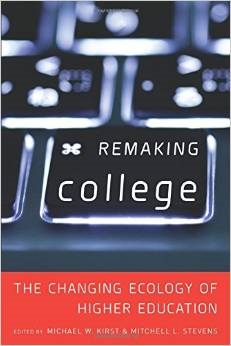 Since the 2008 recession, higher education “experts” have surfaced by the thousands. Some hold political office, some are entrepreneurs, some are writers, and some self-qualify simply because they graduated from college and believe their personal perspective is all that matters. Sadly, most of these so-called experts form their opinions based on a narrow view of higher education without examining the broader, more diverse landscape of institutions educating a wide spectrum of students.
Since the 2008 recession, higher education “experts” have surfaced by the thousands. Some hold political office, some are entrepreneurs, some are writers, and some self-qualify simply because they graduated from college and believe their personal perspective is all that matters. Sadly, most of these so-called experts form their opinions based on a narrow view of higher education without examining the broader, more diverse landscape of institutions educating a wide spectrum of students.
I was therefore pleasantly surprised by the recently-published book, Remaking College: The Changing Ecology of Higher Education. Edited by Stanford faculty members Michael Kirst and Mitchell Stevens, the book’s genesis is the convening of several education scholars in 2013. Its introduction should be mandatory reading for all of the self-anointed “experts” as it succinctly reviews the evolution of higher education from 1945 – present. My favorite portion is worth quoting:
First, inherited academic and policy wisdom assumes a proper and relatively bounded stage of the life course for college: a period just after high school but before career initiation, childbearing, and cohabitation. It imagines a student who enrolls in college full time, ideally resides on a physical campus, remains unmarried and childless while in school, engages in minimal paid work, and completes a degree within four to six years. But in contemporary America, students fitting this description are a shrinking minority of the overall college-going population. Academic research and policy discourse organized on the presumption of such students misrepresents reality. [Italics are mine.]
The rest of the book is organized as follows:
- Understanding the Changing Ecology provides background on the changes in higher education. Richard Scott’s chapter on Multiple Field Perspectives identifies six types or populations of colleges and provides another memorable quote – “The top-tier universities are hardly representative of the thousands of colleges and universities in America-some forty-two hundred-that have emerged during the past half century and now account for most of the providers and enrollments in higher education.”
- College and the Life Course describes the landscape of early adulthood and its implications for broad-access institutions, and also describes the smaller population of “traditional” students and its implications for diversity and access.
- Assessment and Governance in the Changing Ecology is fairly critical of the slow pace of institutional change and accreditation and addresses measuring college performance and emerging policy changes in K-12 and higher education.
- Lastly, A New Research Agenda discusses human resources in broad-access institutions, outcomes at broad-access institutions, and a proposed research framework for higher education. The research framework is a matrix of topical domains and analytic levels, including fields, markets, governance, learning, and careers and corresponding analytic levels for organizations, leaders/faculty/staff, and students. Any of these boxes on the matrix may already be familiar to researchers. However, the authors classify the chapters of this book in their relevant box, thus leaving a stake in the ground for anyone searching for thoughtful writing about the changing ecology and the policy and practical implications of working with the majority of today’s college students .
While Remaking College may have been written to reframe the direction of higher education research, I think it’s also relevant for both policymakers and leaders of institutions. Neither group is likely to read this book in its entirety; however, the introduction is a must-read for all and much of the balance would be a good source for their key staff members.
America can ill-afford to have memories of the experiences of policymakers and their staff at primarily elite institutions drive the changes needed to make our higher education institutions more affordable, accountable, and accommodating to a diverse student population. The dynamics of a global economy, combined with technology’s tendency to reduce the distance limitations of knowledge workers, make it imperative that the basis for changes needed to increase college completion rates is grounded in reality.











